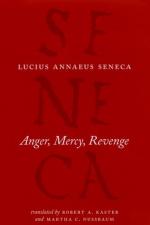|
This section contains 14,606 words (approx. 49 pages at 300 words per page) |

|
SOURCE: "Seneca," in A Handbook of Classical Drama, 1944. Reprint by Stanford University Press, 1963, pp. 401-36.
In the following excerpt, Harsh examines Seneca's works against the backdrop of his life and times.
Seneca … was a man of the highest social, political, and economic status. He early distinguished himself in literature, as his father had done in rhetoric, and he left an impressively large body of writings. Much of this has survived to make him the most influential Latin prose writer after Cicero. His primary interest was clearly moral philosophy; but his activity in letters, as in business, extended far and wide. Among his lost works was one on the geography of India, one on the form and one on the movement of the earth. These, like his extant work entitled Natural Questions, are noteworthy here because the scientific interests which they reveal are observable in his tragedies.
Nine tragedies...
|
This section contains 14,606 words (approx. 49 pages at 300 words per page) |

|


